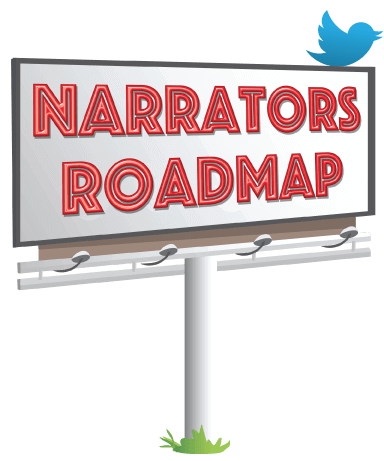Black, Indigenous, and Person of Color (BIPOC) people have struggled against systemic racism and discrimination throughout history. As a result, these groups of people have been underrepresented as both characters in published books and narrators of audiobooks.
The publishing industry as a whole is predominantly full of white people, although steps are being taken to improve representation in all areas.
All narrators, but especially caucasian narrators, must be sensitive to these social issues and the affect our work has on the world when deciding whether to accept an audiobook contract. We must evaluate whether our skills and background make us an ideal match for the author’s point-of-view and text.
Just because you COULD do it doesn’t mean you SHOULD do it.
Each narrator always has the option of turning down a project and suggesting a colleague who would be a genuine fit for the material.
For instance, let’s say a caucasian actor accepts a book where the main character is a Black person. The white actor is denying an authentic role to a Black person who is uniquely qualified to tell the story and should have been cast.
Thanks to narrator Leon Nixon who gave me permission to reprint these comments that he originally wrote on Facebook.
Casting is more than just choosing someone who can do a good representation of the character — the tone, inflection, accent. Casting is really about the person. Everything that we’ve done in our lives lives in us and never goes away. So when we, as professional storytellers, tell the story, we’re telling it from our unique perspective. From our experience.
When one of us is selected from our audition, or just flat out chosen for a project, we’re usually not chosen because we had a kick ass read. Heck, we’re pros. We can all give one of those. We’re generally chosen because we have a unique connection to the material.
Sure, the author has written the intention and so on, but as individuals it is important to remember, some things live very deep inside of us which make us who we truly are, and that thing — that je ne sais quoi, can’t help but come out when we tell the story. That cannot be replaced. It can’t be substituted by someone who can do “the voice” of…
In this 1-hour webinar from PRH Audio with a diverse panel of 2 narrators and 1 producer, narrator January LaVoy noted that the narrator is the “custodian of the story”. It’s up to the narrator to take responsibility for the parts we accept.
I highly encourage you to watch this webinar. The conversation about how white narrators should approach text with ethnicities so that we can honor the text and the author’s intent is particularly beneficial.
Since a single narrator voices all of the roles in a book, it’s appropriate and customary for a narrator to voice supporting and minor characters with different ethnicities. We treat all characters respectfully so that we don’t portray a stereotype. Play the characters as if they are real people and remain true to the author’s intent.
People who identify their sexual orientation or gender identity as Lesbian, Gay, Bisexual, Transgender, Queer, or Questioning (LGBTQ) have been marginalized in society. Casting decisions about books with LGBTQ characters and themes also deserve added consideration. Where the main character’s sexuality or gay life/culture is a large part of the story, a gay actor might best serve the text and probably would appreciate the opportunity for representation. One’s sexuality may not be evident to others, which could increase the difficulty of the actor’s decision whether to narrate the book or recommend a colleague for it.
Case Study
In this example, a miscast narrator went beyond disrespectful and created a terribly racist and misogynistic reading that understandably angered the author. Be sure to note the title of the piece, listen to the narrator’s performance, and read some of the tweets about it.
WHAT THE HELL IS THIS?!?! @FiresideFiction @KevinRineerVO This is what you think I’d sound like? What BLACK WOMEN AND SOUTHERN BLACL FOLKS SOUND LIKE?!?!?! pic.twitter.com/wLCm34P2l2
— Dr. Gina Mae (@redclayscholar) November 24, 2020
In this instance, the producer criticized the narrator’s acting choices and then accepted full blame for the recording, saying in his apology/promise-to-do-better essay, “This basically amounted to auditory blackface, in the worst tradition of racist minstrelsy.”
The white, male narrator deserves every criticism for recording this piece. As soon as he read the opening sentence during his prep, he should have told the producer that he could not perform this piece. He’s not Black, and he’s not a woman. He should not have narrated this 1st-person story.
https://twitter.com/MarySueSays/status/1331284828587581440
Listen to the difference when a Black woman records this author’s words.
HOW THAT SHIT SHOULDA SOUNDED. pic.twitter.com/JDEFsQuE2f
— Dr. Gina Mae (@redclayscholar) November 24, 2020
Finally, read more of the author’s deeply offended reaction to get a better sense of this cultural abomination:
I saw the apology. I don't care. I am angry. Seething from centuries of silenced Black women angry. The voice I speak with and write with is not my own. To have that taken away is unacceptable. Unforgivable. And to ask me to consider it is equally trifling and unforgivable.
— Dr. Gina Mae (@redclayscholar) November 24, 2020
Other resources on this topic:
- Narrator Tara Sands, with input from other narrators, created this one-sheet document that you can give to your rights holders to gather information about the book and help ensure appropriate casting choices.
- This article in Slate provides an excellent discussion about representation and authentic casting concerns faced by audiobook producers and narrators.
- Indian American actress Melini Kantayya describes in this Washington Post op ed how “as an Indian American actress, for me the shadow of [cartoon character] Apu loomed larger in my life than I realized.”
- This article shows results from the 2019 Diversity Baseline Survey. “The book industry has the power to shape culture in big and small ways. The people behind the books serve as gatekeepers, who can make a huge difference in determining which stories are amplified and which are shut out. If the people who work in publishing are not a diverse group, how can diverse voices truly be represented in its books?”
- The lack of diversity in the romance genre caused a major shake-up in its professional organization as detailed in this article.
- For parallels in theatre, read the statement from We See You, White American Theatre.








